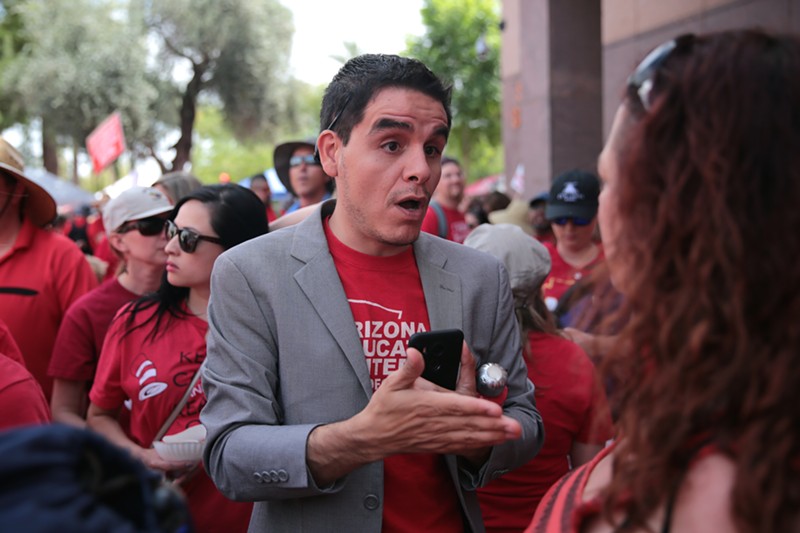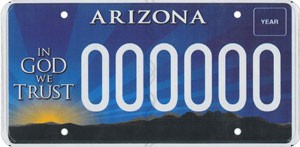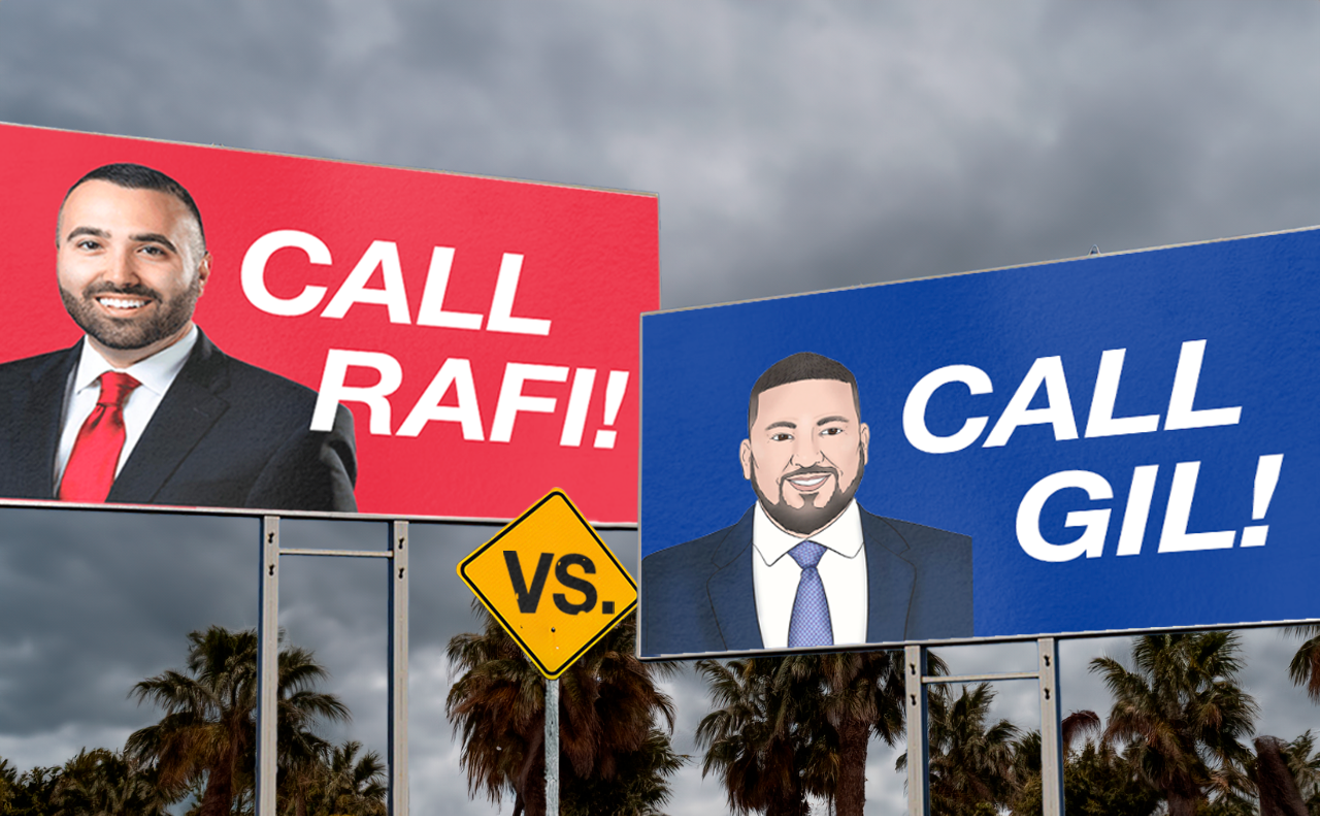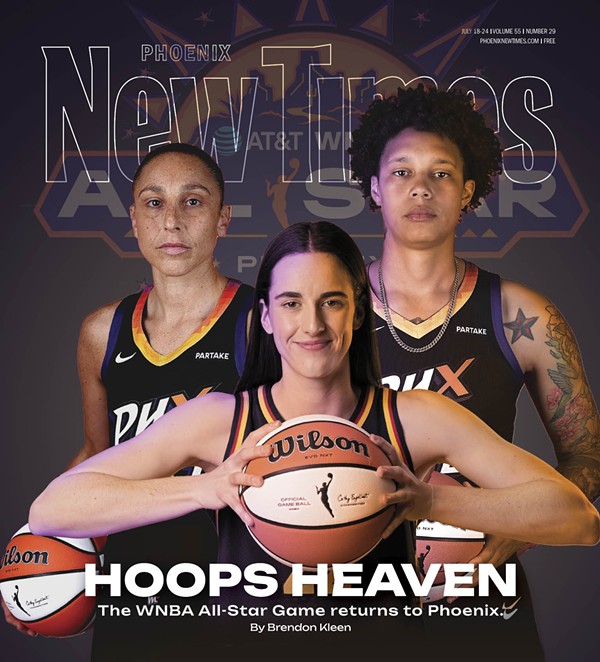The Alliance Defending Freedom is an influential legal advocacy nonprofit based in Scottsdale with a stated mission of defending "religious freedom, the sanctity of life, and marriage and family." In court, the organization has challenged laws that protect the rights of LGBTQ individuals.
Since 2008, the ADF has received funding from Arizonans who purchase the specialty "In God We Trust" license plate offered by the Arizona Department of Transportation, even though state government websites do not disclose that their dollars are funding a controversial Christian group.
Citing the ADF's views on LGBTQ rights, Arizona Senator Juan Mendez, a Democrat from Tempe, has filed legislation along with a number of co-sponsors to strike the "In God We Trust" plate.
The Southern Poverty Law Center lists the ADF as a hate group, citing the organization's "propagation of known falsehoods about LGBT people over the years," and the ADF's legal efforts defending Christian business owners who want to deny services to LGBTQ clients.
In a statement on Friday, the ADF's senior counsel Jeremy Tedesco struck back, accusing Mendez of a discriminatory anti-campaign affecting people of various faiths.
"This is not about money. This is about religious discrimination," Tedesco said in an emailed statement. "Arizona State Senator Juan Mendez’s actions are discriminatory against people of faith that share commonly held beliefs across the Jewish, Islamic, and Christian faiths."
In response, Mendez said the ADF is misinterpreting his intentions.
"I'm not singling out religion and trying to attack religion," he told Phoenix New Times on Friday. "That definitely was not my point. To me ... they're a hate group. They're against a lot of the values that me and my constituents represent, and I definitely have people that don't feel safe that our government is helping support their mission."
Mendez is an atheist. Given the opportunity to say the opening prayer during floor sessions at the Legislature, Mendez has instead read verses of poetry and quoted Carl Sagan.
Visitors to the ADOT website who are interested in purchasing the "In God We Trust" plate see a message that says $17 of the $25 fee for the plate "goes to promote the national motto 'In God We Trust.'" By law, the ADF "must use the donations to promote the national motto 'in God we trust', first amendment rights and the heritage of this state and nation."
Neither the text of the law nor the ADOT website indicates the $17 fee funds the ADF.
According to an ADOT spokesperson, the license plate has raised $827,000 for the ADF since fiscal year 2014. That's a small portion of the ADF's overall revenue: In an IRS filing, the organization reported receiving over $50 million in contributions, gifts, and grants during 2015, the most recent available tax year.
On the "In God We Trust" plate, the motto appears in a dignified font over sunbeams cresting a mountainous ridge.
The license plate is one of dozens of specialty plates offered by ADOT. Other decorative plates fund entities like the state's public universities and the private, Christian school Grand Canyon University; causes such as litter cleanup through the organization Keep Arizona Beautiful; and charities affiliated with Arizona professional sports teams.
Because the "In God We Trust" plate is written into state law, getting rid of it requires legislative action.
Lobbyist Tory Roberg, who represents the Secular Coalition for Arizona, worked with Mendez on the new legislation, consisting of two bills aimed at ending the "In God We Trust" plate and enacting new transparency requirements. The latter bill would require that the state publish the name of the organization benefiting from each plate.
The bills are: SB 1462, which would require ADOT to establish a database listing the sales of each specialty plate, the entity receiving the revenue, and the annual sum generated by each plate; and SB 1463 which would repeal the "In God We Trust" plate from state law.
The state of Arizona should not be funneling money to the ADF through the license plate, Roberg said.
"People don't even know that they're giving their money," she said. "I'm sure that there's some people who [will] find out that the money's going there, and they'll be like, 'Great!' They'll be happy about it. But there's other people who will be like, 'What?'"

A billboard sponsored by the Secular Coalition for Arizona and the group American Atheists calls out the ADF-funding license plate.
Courtesy of Secular Coalition for Arizona
The ADF's court battles have generated significant publicity and controversy. The organization represented Colorado baker Jack Phillips in Masterpiece Cakeshop v. Colorado Civil Rights Commission, a case decided by the U.S. Supreme Court in a narrow 7-2 decision.
And last month, the Arizona Supreme Court heard from the ADF during oral arguments in the organization's lawsuit representing Brush & Nib Studio. The Phoenix studio's Christian owners believe a 2013 city ordinance banning discrimination on the basis of sexual orientation violates their rights because under the law, Brush & Nib must create wedding invitations for LGBTQ couples.
Lower courts in Arizona ruled against the artists and found the Phoenix ordinance does not violate the artists' First Amendment rights.
While the ADF has made these court fights part of its mission, opponents say Arizonans who buy the specialty license plate are inadvertently bankrolling the group's high-stakes legal battles.
In his statement, Tedesco said, “Arizona is well within its rights to offer its citizens an opportunity to voluntarily purchase license plates affirming the First Amendment and contributing to ADF's work on behalf of the freedom of all Americans to live and work according to their beliefs."
Referring to Mendez, he added, "It’s disappointing to see elected officials become uncritical pawns in the Southern Poverty Law Center’s ugly propaganda campaigns."
Mendez said he favors ending the plethora of Arizona specialty license plates altogether because of the difficulties they pose for law enforcement and because of the way the government, through the license plates, facilitates fundraising for various groups.
He called the ADF a "pretty radical" organization trying to pass itself off as mainstream.
"To me, it sounds very dangerous that they're so open and forward," Mendez said. "And that they raise money on these messages of hate."













